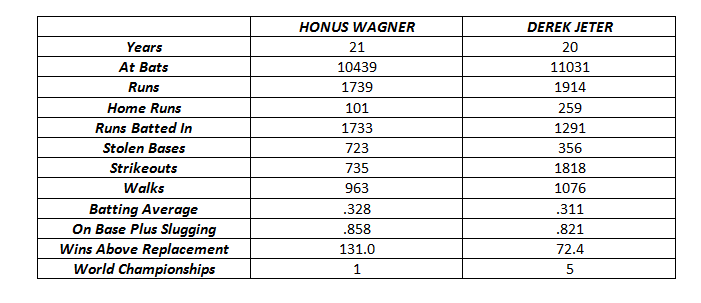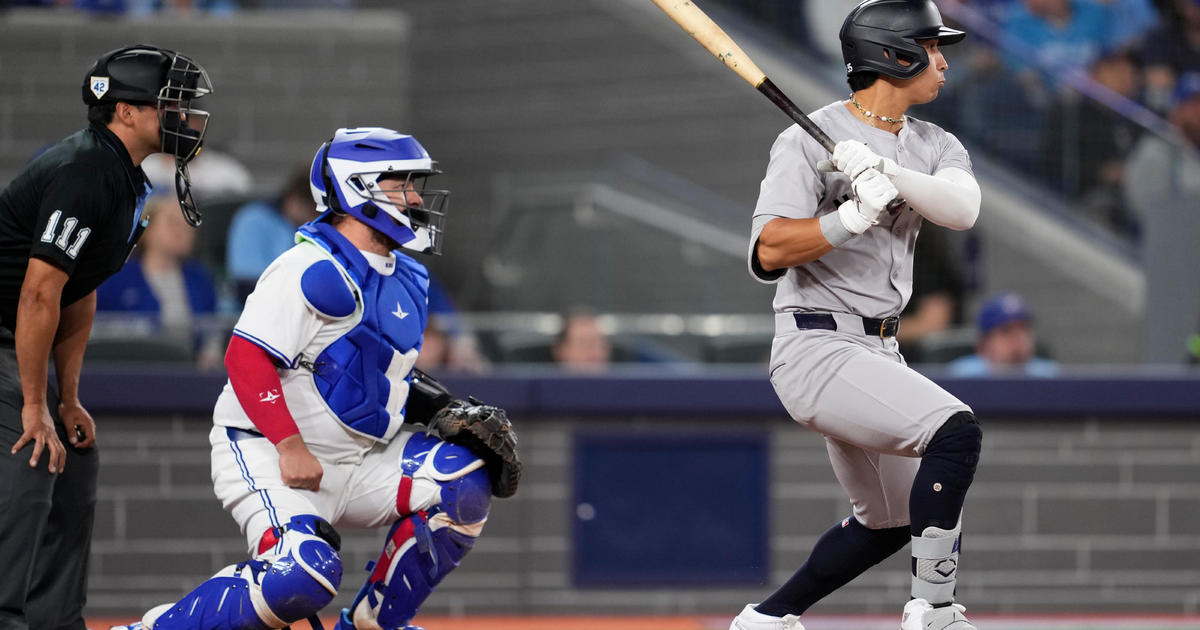By The Numbers: Has Derek Surpassed Honus As The Greatest Shortstop Ever?
By Father Gabe Costa
» More Columns
A century ago, "Inside Baseball" ruled the national pastime. Ty Cobb was king of the American League and Honus Wagner was the pride of the National League. Both immortals used a split grip when batting, and managers dictated baseball strategies that employed the bunt, the sacrifice, the squeeze play and the stolen base.
Numberless games were decided by scores of 1-0 and 2-1. The home run? Forget it! Hall of Famer John Franklin Baker would be known as "Home Run Baker" without ever hitting more than a dozen home runs in a season.
Wagner was a gentle, humble soul, beloved by virtually all who came into contact with him. He was a right-handed hitting shortstop. Cobb, a left-handed hitting outfielder, seemed to be of another ilk. By his own reckoning he was like a tightly wound watch spring -- always ready to pounce.
Yet both of them "ruled the playing field with awe."
The only time they seriously crossed swords on the diamond was in 1909, with Wagner's Pirates defeating Cobb's Tigers in seven games during the World Series.
Cobb, known as The Georgia Peach, would go on to play for nearly another two decades, retiring after the 1928 campaign. When he retired, he was considered by many to be the greatest player ever. This was based on, among other statistics, the overwhelming total of the nearly 4,200 hits he amassed. He stole almost 900 bases and won twelve AL batting titles during a thirteen-year span. (Note that recent research has lowered the number of batting crowns to 11.)
Wagner, nicknamed The Flying Dutchman, would retire after the 1917 season. He would accumulate more than 3,400 hits, steal over 700 bases and win eight NL batting titles. He was thought to be, by many experts, even greater than Cobb.
For a good half-century after they retired, Wagner and Cobb more than "held their own" when compared to the great players who followed them, including the likes of Babe Ruth, Joe DiMaggio, Ted Williams and Willie Mays. And both Cobb and Wagner were virtual locks with regard to the composition of any all-time All-Star team. It was unthinkable not to put Cobb in the outfield or Wagner at shortstop.
But then sabermetrics came into the picture.
Scholarly researchers such as Bill James, Pete Palmer, John Thorn Bill Jenkinson and many others looked at the records in a new way with a fresh methodology, and writer after writer kept converging to more "objective" results and conclusions.
The literature now strongly suggests that Cobb was not the greatest player ever, nor was Wagner. Yet so great were these pre-Ruthian stars that the consensus reveals that -- sabermetrics notwithstanding -- The Georgia Peach and The Flying Dutchman certainly rank among the top 10 players who ever laced up spikes.
This being said, it is no longer a "given" that Cobb is still an all-time All-Star outfielder. Given the sabermetrical tools, even Cobb might have a hard time breaking into a Williams-Mays-Ruth or a Williams-DiMaggio-Ruth triumvirate.
How about Wagner? Is he still the all-time All-Star shortstop?
A year ago, I would have said "Absolutely!" Now I am not so sure.
This brings us to Derek Jeter.
Jeter recently surpassed Wagner in hits when the Yankees' captain was credited with hit number 3,431. More and more baseball observers are becoming increasingly captivated with Jeter's accomplishments. Is the "greatest shortstop ever" balance tipping toward Jeter?
Let's take a look at some of Wagner's lifetime statistics and Jeter's numbers to date:
 A few comments and observations:
A few comments and observations:
- It should be noted that Wagner played many positions, including the outfield, and he even pitched on occasion. Except the times he was a designated hitter, Jeter has played shortstop exclusively.
- Relative to his time and based on his RBI total, I would say that Wagner had more power than Jeter.
- Unfortunately, there is no real way to compare their fielding.
- Both enjoyed the respect of the fans, teammates, opposing players and team owners.
- Wagner (like Cobb and Ruth) was a charter member of the Hall of Fame, and was elected in 1936. Out of the 226 votes cast, 11 "experts" left Wagner off their ballots. The same was true for Ruth, while four voters did not deem Cobb worthy of entering Cooperstown. Certainly Jeter will be enshrined as well, and on the first ballot, to boot. But will he be elected unanimously? I don't think so.
So, has Derek caught up to Honus? I'm not sure.
At this point, though, I would take Wagner over Jeter.
How about you?
You May Also Be Interested In These Stories



